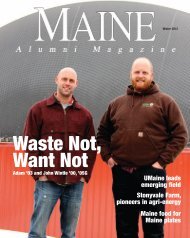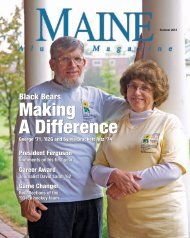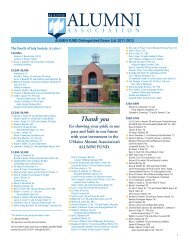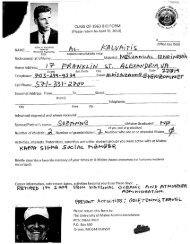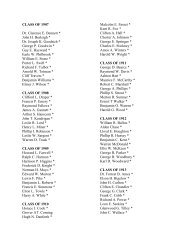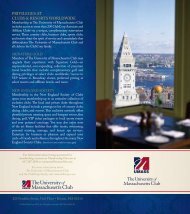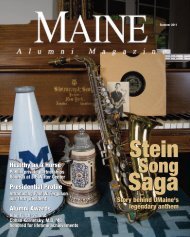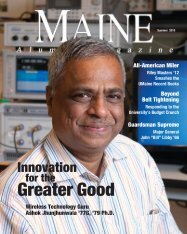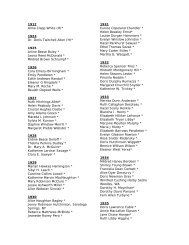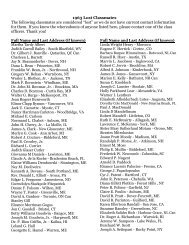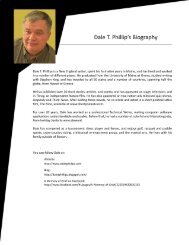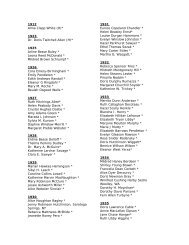UMaine's Diverse UMaine's Diverse - the University of Maine Alumni ...
UMaine's Diverse UMaine's Diverse - the University of Maine Alumni ...
UMaine's Diverse UMaine's Diverse - the University of Maine Alumni ...
You also want an ePaper? Increase the reach of your titles
YUMPU automatically turns print PDFs into web optimized ePapers that Google loves.
<strong>Alumni</strong> Winter 2012_Layout 1 1/6/12 10:31 AM Page 8<br />
Around <strong>the</strong> Campus<br />
Researchers Discover<br />
New Chemical Process<br />
for Producing Bi<strong>of</strong>uel<br />
Treetops and limbs left as waste<br />
by <strong>the</strong> forest products industry,<br />
along with municipal solid<br />
waste, agricultural waste, and<br />
construction waste may be transformed<br />
into a hydrocarbon fuel oil, thanks to a new<br />
process developed at <strong>the</strong> <strong>University</strong> <strong>of</strong><br />
<strong>Maine</strong>. M. Clayton Wheeler, associate<br />
pr<strong>of</strong>essor <strong>of</strong> chemical and biological engineering,<br />
and undergraduate students in his<br />
lab have discovered a chemical process that<br />
can turn <strong>the</strong>se waste products into bi<strong>of</strong>uel.<br />
The process, <strong>the</strong>rmal deoxygenation<br />
(TDO), will work on <strong>the</strong> cellulose found in<br />
wood or substances that contain cellulose<br />
or carbohydrates.<br />
Researchers used grocery store waste<br />
such as banana peels, cardboard boxes, and<br />
shelving to successfully make a batch <strong>of</strong> <strong>the</strong><br />
fuel. Since <strong>the</strong> fuel does not require an<br />
uncontaminated cellulose source, <strong>the</strong> TDO<br />
process and its resulting oil are less expensive<br />
to produce than a purified source<br />
would require.<br />
The fuel has properties that make it<br />
suitable for use in a number <strong>of</strong> fuel tanks<br />
and pipelines. Fur<strong>the</strong>r refining would be<br />
required to upgrade it for use as transportation<br />
fuel.<br />
Men in canoes and a bateau on South Branch Lake, <strong>Maine</strong>,<br />
ca. 1900, photo courtesy <strong>of</strong> <strong>the</strong> <strong>Maine</strong> Folklife Center.<br />
U<strong>Maine</strong> Collaborates with Library <strong>of</strong> Congress<br />
The <strong>University</strong> <strong>of</strong> <strong>Maine</strong> and <strong>the</strong> Library <strong>of</strong> Congress’s American Folklife Center<br />
have entered into an agreement that will allow for <strong>the</strong> preservation <strong>of</strong> an invaluable<br />
collection held at U<strong>Maine</strong>’s Folklife Center. The collection, known as <strong>the</strong><br />
Nor<strong>the</strong>ast Archives <strong>of</strong> Folklore and History, was developed by <strong>the</strong> late,<br />
legendary U<strong>Maine</strong> pr<strong>of</strong>essor Edward “Sandy” Ives over <strong>the</strong> course <strong>of</strong> 50 years. It documents<br />
<strong>the</strong> history and traditions <strong>of</strong> fishermen, loggers, mill workers, and diverse people<br />
living in <strong>Maine</strong>, New England, and <strong>the</strong> Canadian Maritime Provinces.<br />
The collaboration will enable <strong>the</strong> collection to be preserved at optimal conditions. The<br />
Library <strong>of</strong> Congress will digitize <strong>the</strong> collection, which will greatly expand access to <strong>the</strong><br />
audio files, video files, photographs, and o<strong>the</strong>r materials. Digital forms <strong>of</strong> <strong>the</strong> collection<br />
will remain at <strong>the</strong> Folklife Center.<br />
“This is an acquisition not just for <strong>the</strong> Library <strong>of</strong> Congress, but it is an acquisition for<br />
<strong>the</strong> nation,” said David Taylor ’74, a former student <strong>of</strong> Ives who is head <strong>of</strong> research and<br />
programs at <strong>the</strong> Library <strong>of</strong> Congress. “It is a national treasure for all Americans to use to<br />
better understand <strong>the</strong> regional culture <strong>of</strong> <strong>the</strong> Nor<strong>the</strong>astern United States and Maritime<br />
Provinces <strong>of</strong> Canada.”<br />
Paige Case ‘11, who earned a degree in chemical engineering, holds a<br />
bottle <strong>of</strong> bi<strong>of</strong>uel which she helped develop while working in <strong>the</strong><br />
laboratory <strong>of</strong> U<strong>Maine</strong> chemical and biological engineering pr<strong>of</strong>essor<br />
M. Clayton Wheeler.<br />
8 MAINE <strong>Alumni</strong> Magazine



